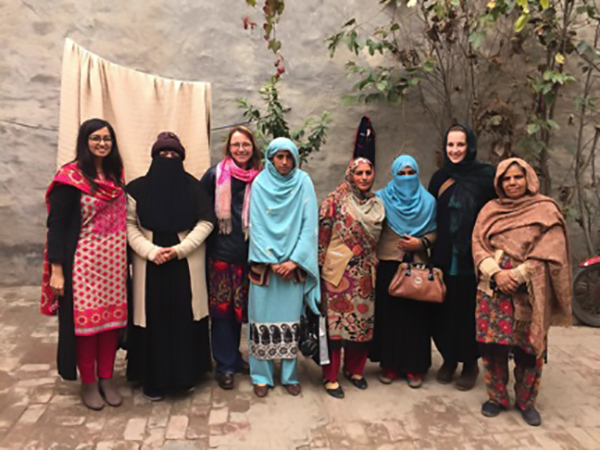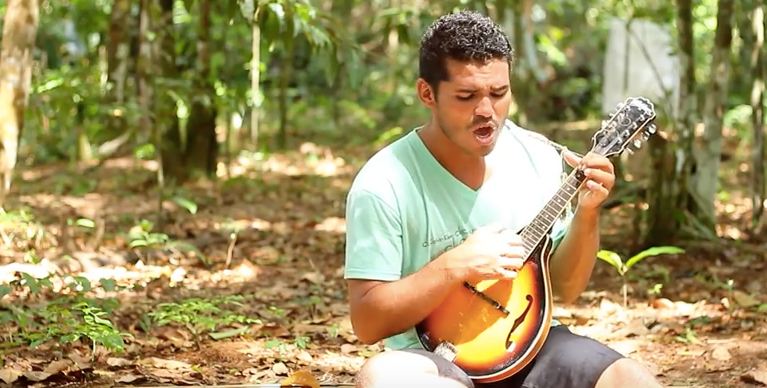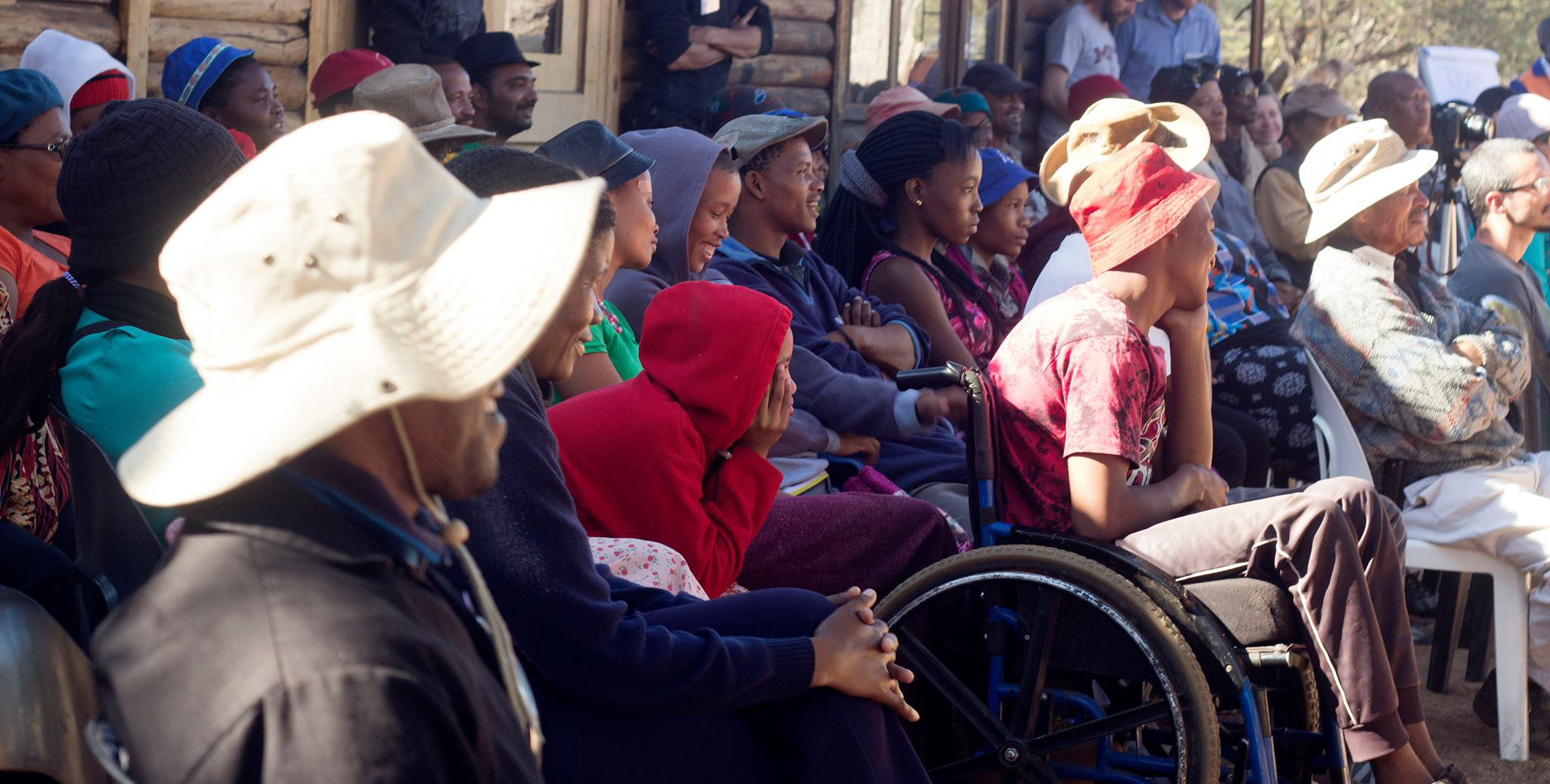"What Are You Doing for Others?" The Value of Community Engagement at IDDS Lahore

Featured Photo: Spicy Hath (women members only) and lady health workers.
How fitting that the day we celebrated Martin Luther King Jr. Day in the U.S. was the day we had our second site visits here at IDDS Lahore. The Apple homepage that came up on my internet browser displayed a photo of MLK Jr. overlaid with his famous quote: “Life’s most persistent and urgent question is, `What are you doing for others?’”
We have 40 participants and organizers here at IDDS Lahore from 15 different countries (and six continents, if you’re counting.) We have six teams working for just two weeks on designing information and communication technologies (ICT) with substantive user input for the health, education, livestock and artisan livelihood sectors. Last Saturday morning, we had concepts. Ideas. Teams envisioned systems such as:
- an automated attendance tracking and communication system to alert parents if their child is absent from school;
- a data-based communication system for improving the supply chain efficiency for routing deworming medicine to livestock farmers (thereby improving the ability of female extension workers to provide this needed product on time and earn money in the process);
- and a system to improve the connections between micro-entrepreneurs and shops who are in need of their arts and crafts products.
But within two jam-packed days (and nights!), several teams had working prototypes of their phone/tablet apps or SMS-based communication systems to share with prospective users and stakeholders!
Yesterday, I accompanied one of the health teams to their field site. This particular team, self-named Spicy Hath (Spicy Hands), is working to develop an electronic-based tracking and information system for lady health workers (LHWs) administering polio vaccinations. Polio is a highly infectious viral disease, which mainly affects young children. One in 200 infections leads to irreversible paralysis. There is no cure for polio, but it can be prevented with a polio vaccine, which is given in 4 doses over 5 years (WHO 2016). Pakistan and Afghanistan are the only two remaining countries with active polio cases. LHWs dedicate one week out of every month to this campaign. While critically important, it also takes time away from their other healthcare responsibilities. So we wanted to see if we could together work to improve efficiencies in the process of completing their polio campaign responsibilities.
During the campaign week each month, LHWs go door-to-door seeking out children under 5. To advance the eradication effort, the LHWs are required to administer the polio drops to every child regardless of whether or not the child has previously received a polio injection or drops. Currently, tracking is done via a complicated but carefully-maintained system of record books, wall posters at the Basic Health Unit, and chalk marks outside the entrance to each residence.

Our team, self-named Spicy Hath, is working on a communication system system they call “Polio Buddy” which can be used via a feature- or smart-phone to convey two-way information on the number and ages of children at each residence. This system is aimed at reducing inefficiencies in the current process and reducing the number of unnecessary polio vaccinations each child receives. Some children receive one vaccination per month until they are 5 – imagine! This can be more than 50 polio vaccinations! No wonder many parents get annoyed when they see the LHWs coming on polio campaign week. According to Amna Batool, team facilitator, “This system would help the LHWs better plan their routes, provide more current information on where to find the children who need to be visited and who has already been visited, reduce duplication of visits during a campaign week and build trust with the parents.”
Upon arrival at the Basic Health Unit, we were warmly greeted by a group of LHWs. Our Urdu speakers introduced our team and our intention. I could not understand the Urdu introduction, but I certainly sensed the palpable excitement accompanying the eruption of excited chatter from women who were delighted to be asked to provide user feedback.
.jpg)
We spent several hours learning more about their current record-keeping processes and the protocols for their role in seeking out and vaccinating children during polio campaign weeks. Now that I know what the chalk marks represent, I am seeing these marks everywhere, even right in the streets of Lahore. The LHWs walked us along a portion of their route, invited us in to see one of their homes (including a bedroom/home office), and ushered us into a courtyard of one of their patients, complete with two babies. One LHW and mother role-played a typical polio campaign interaction, and she showed us the mark on her child’s finger showing that the child had received polio drops in the latest campaign. (Regardless, this child will get more drops next month, and the next month, and so forth.)
At one point, the mother disappeared into her home and returned quickly with complete yellow immunization cards, including the date of a recent polio injection. “Despite how readily the mother was able to retrieve this card,” the LHWs explained, in a frustrated tone, “this information is completely disregarded during the polio campaign.”

Spicy Hath also had the opportunity to describe and show, in prototype form, their concept for an electronic-based system that would lessen the LHW load and be designed to operate in the typical field context. Their feedback has already helped to shape the next steps in the project, including streamlining their system and relying on existing house numbers rather than creating and posting new ones.
It is indeed a privilege to have the opportunity to spend two weeks with this group of talented and energetic people who stem from many countries and professions. The common thread appears to be an intention to create change and have impact, particularly with people who live in poverty. We can only do so much in two weeks, but many of us hope that some of the projects will be carried forward by passionate changemakers in one form or another. I am one of these who hopes. Who hopes that our work, our solutions or systems can help make someone’s life better. But I also know that we are empowering individuals with design and entrepreneurship skills, teamwork and technical skills; all within a network of kindred spirits who can encourage each other regardless of his/her passion for positive social impact. It is a privilege to have the opportunity to work with our stakeholders, such as lady health workers. Everyone here will carry their spirit and generosity home in our hearts. And we recognize that we are also a beneficiary in what we learn and how we grow as individuals during these interactions.
So yes, Dr. King, I can answer your question today of all days. I, but moreover we, as in the IDDS community are working for change. We are striving to go beyond just doing things for others, and learning to do it with others. To work with each other, gain cultural understanding and compassion, and, of course, to make lives better.
Dr. Kendra Sharp is an IDIN network member, Professor of Humanitarian Engineering at Oregon State University, and co-lead instructor for IDDS Lahore. For more info on IDDS Lahore, please check out the IDDS Lahore blog or contact the IDDS Lahore organizing team at idds-lahore-organizers@mit.edu.






